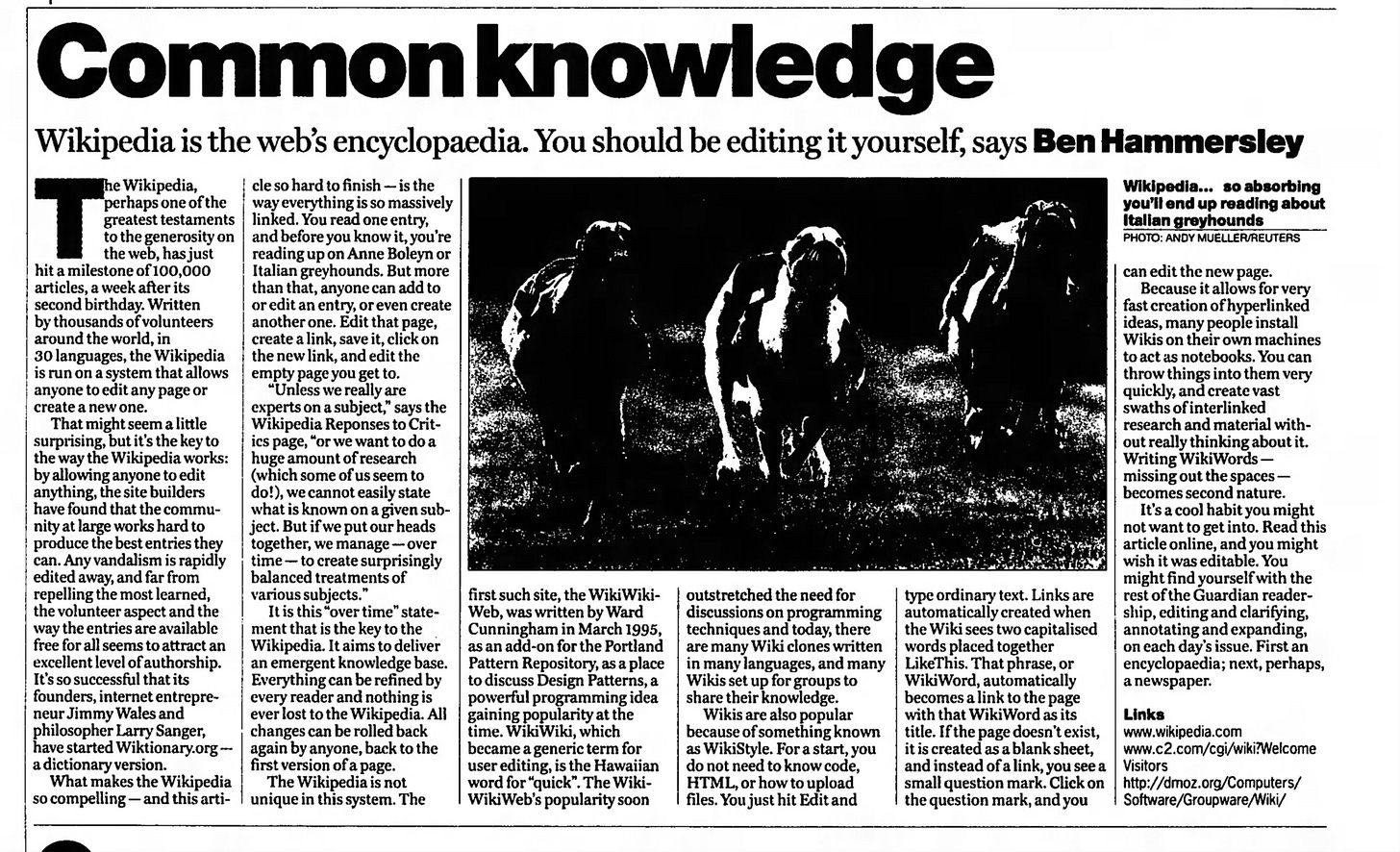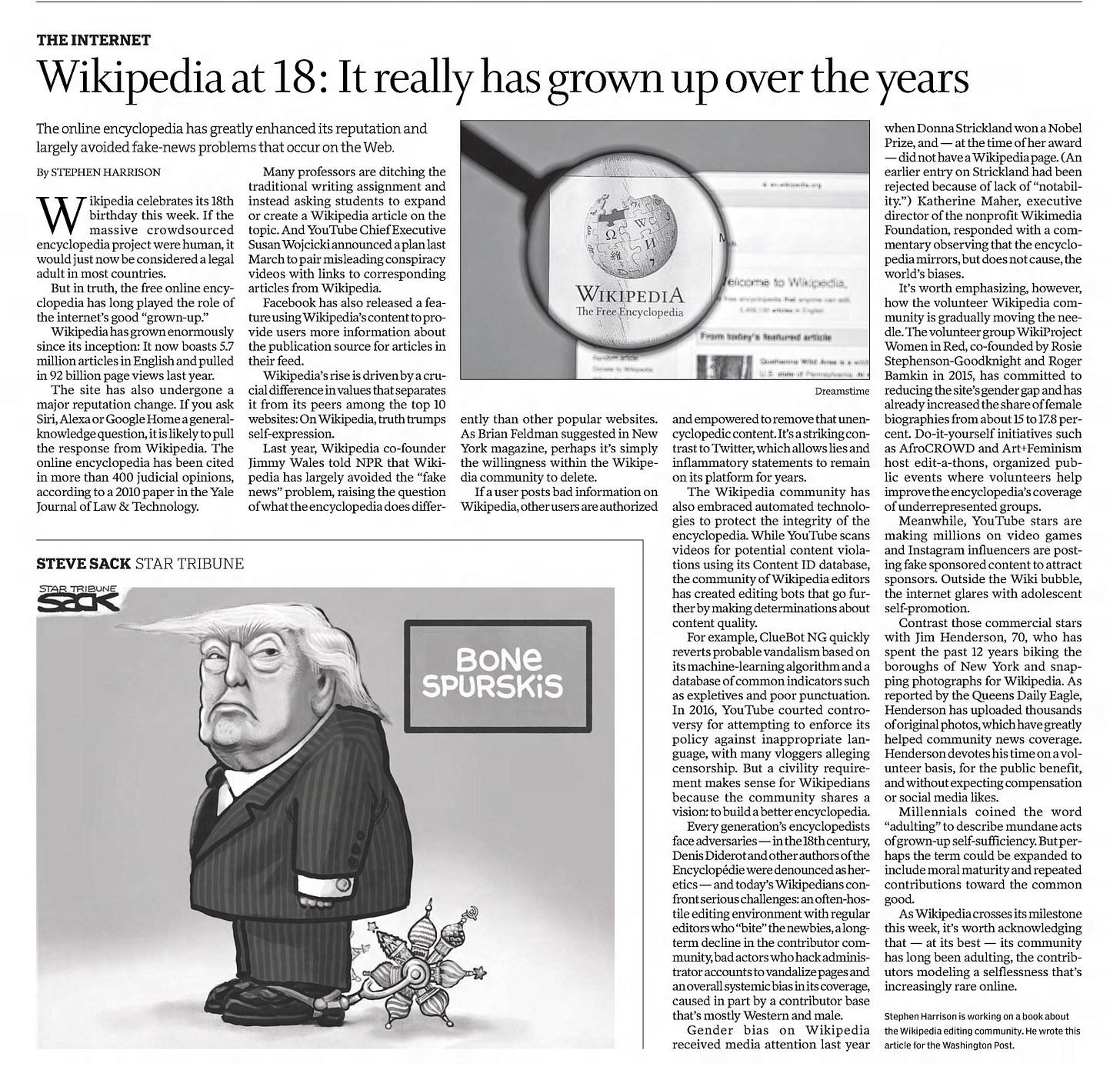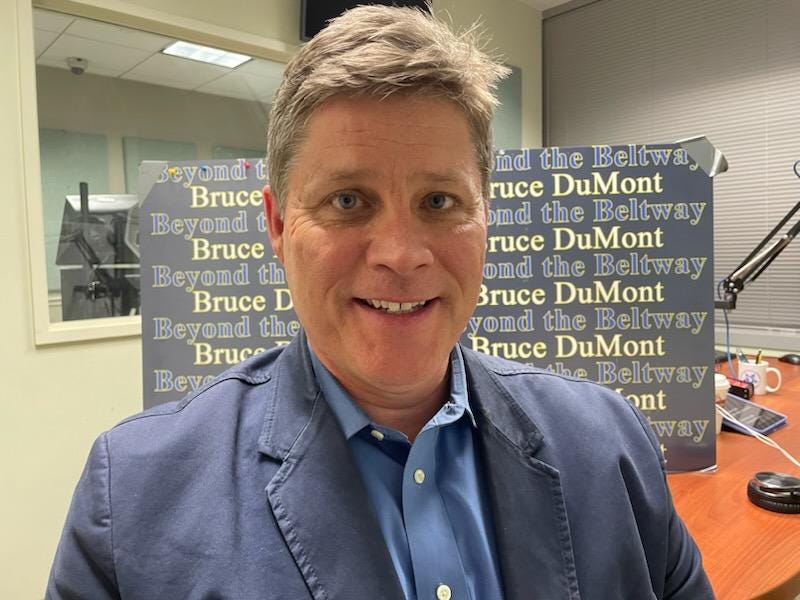Why I Love Wikipedia
In contrast to destructive forces that cynically trade in misinformation and outright lies, the world's biggest online encyclopedia is a champion of creating accurate information for all.
When you go to Wikipedia, what do you see?
A collection of words and images? Information about a subject, maybe a set of subjects? A rabbit hole that leads you down trails you never knew existed?
Here’s what I see: a bulwark against the storm of misinformation that has inundated our lives, seeping into public discourse and corrupting public figures who either know better or should know better.
I bring this up because, just as in years past, Wikipedia a few days ago solicited a donation from me. They “had me at hello,” to borrow a line from the 1996 movie Jerry Maguire. That line, by the way, has a Wikipedia page dedicated to it.
Well, of course there’s a page for that. As of a few days ago, there were over 6.7 million articles on the English Wikipedia containing over 4.3 billion words. That’s just in English; Wikipedia has 335 language versions.
Wikipedia’s power is in the thousands upon thousands of people (over 300,000 per month) who team up to create the content there. These passionate, generous souls strive to build and nurture knowledge responsibly.
Building something, anything of worth tends to be extremely hard. It requires sacrifice. And focus. And perseverance. And specialized skills. And so much more.
By contrast, tearing something down is so easy. All it takes is jealousy or pettiness or greed or anger or insecurity or—you surely get the point. All negative stuff in this corner.
Over the last few decades, those ills have pervaded our culture in a bigger way than before. As nefarious forces have gained a greater grasp of just how effectively viral the Internet can magnify their manipulations and distortions, the result has been an increasingly polluted social media that has seeped into mainstream media and shows up relentlessly in cynical click-bait headlines that play on fear and divisiveness.
And here’s the uphill battle that’s ever before us:
The equation to creation is filled with “ands”—there are so many elements that must come together for it to happen. By contrast, destruction is a low-hanging “or” beast—any one of a multitude of flawed qualities can destroy.
Put another way: regardless of what you might think about the words I have written so far, it has taken me hours of effort to come up with them. In one “Delete” keystroke, I can wipe them all out.
So, yeah, I ponied up a little money for Wikipedia the other day. It was a vote for creation.
First, I am grateful for the knowledge that I gain from countless times accessing the world’s largest online encyclopedia. But beyond that, I highly value what we all gain, as a society, from a resource that makes a sincere concerted effort to promote accuracy while being vigilant in debunking misinformation, inaccuracies and flat-out lies.
The site is far from perfect, and it has experienced growing pains, but as this 2019 essay notes, “It really has grown up over the years.”
One of its hallmarks is the clear citation of sources, so visitors can gauge credibility of information accordingly. The site also has checks and balances that include notations of “citation needed” to push for that sourcing. An excerpt from the Wikipedia citation template page linked in the previous sentence:
“Contentious material about living persons that is unsourced or poorly sourced should be removed immediately. Do not tag it; immediately remove it. This includes material that is disparaging, misrepresentative, insulting, harmful, or possibly libelous.”
These parameters and protocols mirror longstanding journalistic standards of integrity. This stance is desperately needed, especially in our era of “alternative facts” and where a rising number of elected officials shamelessly spout falsehoods. Against that cynical backdrop, it’s a great encouragement to know that volunteers who create, edit and verify information are what fuels Wikipedia.

There are numerous worthy causes competing for our support, so odds are you’ve not yet donated to Wikipedia. In fact, only about 2% of Wikipedia users donate to it, according to the Wikimedia Foundation, the site’s non-profit arm.1
Let me close by quoting from a thank-you note that Maryana Iskander, CEO of the Wikimedia Foundation, sent in response to my contribution:
Every single donation helps us to improve people’s access to accurate and reliable information, especially in a rapidly changing world. I’m truly grateful for your support in enabling billions of people to experience the gift of knowledge through Wikipedia.
We are determined to extend this access as far as possible to make sure that no matter where you are born or where you live, the ability to access free knowledge is always within your reach.
What’s not to love about that?
Beyond the Beltway
Last Sunday evening, I served as a panelist on “Beyond the Beltway with Bruce DuMont,” a nationally syndicated radio show on politics that has been on the air for over 43 years.
Bruce and I met in May 2016, when he delivered a keynote talk2 for the Celebrating Seniors Coalition, a local non-profit here in the Chicago area that supports and honors older adults.
The recent “Beyond the Beltway” program delved into various aspects of the national immigration issue, with homelessness an adjacent subject. Bruce’s first invitation came in May, after my first essay about Phil, who has experienced homelessness off and on for decades:
Brother Love
On Sunday, my brother Phil’s 57th birthday, I helped him move 10 miles from a subsidized apartment on Chicago’s North Side to another one in the South Loop. Without the intervention of not-for-profit organizations dedicated to combatting homelessness, I don’t know if Phil would still be alive. But I have little doubt he’d be experiencing the homelessnes…
My schedule didn’t permit coming on the show then, but after my essay last Saturday, Brother Love: The Water is Boiling, Bruce reached out again.
My input on the program, which you can see below, extended to the night’s other topics as well. I am the anti-pundit—I strive to be diplomatic, not dogmatic. In retrospect, especially after reflecting on Wikipedia’s role in the world, I was too diplomatic at times.
For example, at one point another panelist parroted an easily debunked inaccuracy that undocumented immigrants are paid $2,200 a month by the federal government. On the spot, I did not have the time to counter the claim, so I expressed my skepticism by quoting something I learned many years ago in journalism school:
“If your mother tells you she loves you, check it out.”3
Now, with some time to check it out and in the spirit of pushing back on misinformation, I share this clearly and credibly sourced 82-second video clip that sets the record straight:
My thanks to Bruce for having me on the program, and for providing plenty of opportunities to express my perspective throughout the evening. For those who are interested, a concentrated discussion on Phil’s and my relationship begins around the 1-hour, 20-minute mark:
From its pitch that popped up when I went to Wikipedia the other day:
“We ask you to reflect on the number of times you visited Wikipedia in the past year, the value you got from it, and whether you're able to give $3 to the Wikimedia Foundation. If you can, please join the 2% of readers who give. If everyone reading this right now gave just $3, we'd hit our goal in a couple of hours.
It's hard to know what to trust online these days. Disinformation and scammers are everywhere. Wikipedia is different. It's not perfect, but it's not here to make a profit or to push a particular perspective. It's written by everyone, together. Wikipedia is something we all share, like a library or a public park. We are passionate about our model because we want everyone to have equal access to quality information - something that is becoming harder and harder to find online.”
In his remarks, about six months before the 2016 election, Bruce was prescient in noting that it was a much tighter Presidential race than most were forecasting. “Every conventional assessment that’s been made of politics this year basically has been wrong,” he said.
Anyone reading between the lines can rightly translate what I meant: “What she just said is utter hogwash.”







"Building something, anything of worth tends to be extremely hard. It requires sacrifice. And focus. And perseverance. And specialized skills. And so much more."
This is one of my core beliefs. Perhaps for some people, insight does come easily, I don't know, but I that's only because there was a period of time when they worked very hard, and I think you can only improve if you sweat. And it's that extra two percent that distinguishes the best work and gives it credibility. What is so sad about this virus that Trump represents is that, not only is there a complete lack of effort behind it, but there is at times an active effort to lie, to pursue untruths. It's hard enough to be intelligent even if one is trying to be.
Basically, Wikipedia is an idealistic endeavor, and there are not many of them. Somehow, this skepticism and distrust of it runs deep, which is ironic. I feel like people have never been able to get past that "anyone can contribute to it" and that it isn't created by all PhDs and "experts." For years I never went into the construction of it, but just knew from my experiences that the entries were well-done and trustworthy. Yet, when I did some substitute teaching of middle school in 2022, I still could only mumbled under my breath to the kids that Wikipedia was a good source. I felt like they wouldn't take a teacher seriously who said such a thing.
The New York Times Magazine had a recent article about the future of Wikipedia in an AI world. Everyone close to the subject seemed to take for granted that AI would be a move toward speed but not accuracy. If anyone doesn't have a New York Times account and can't access the article, I'd be happy to make it one of my gift shares of the month for you, so let me know.
https://www.nytimes.com/2023/07/18/magazine/wikipedia-ai-chatgpt.html
I always contribute to Wikipedia. I use it a lot. But I am not naive. It is filled with misinformation. I recall once in particular checking on the Weatherman NY Townhouse bomb making factory and subsequent explosion. This happened in 1970. The article claimed that what they were making were antipersonnel fragmentation bombs and referenced a NY Times article (which quoted the NY City bomb squad). Well I pulled the article from the NY Times archive and it just was not true. The authors or author of the Wiki article totally misrepresented the reference that they cited. Fortunately, they did cite a reference which could in fact be checked. In my previous life as an academic physician, and peer reviewer of articles submitted to academic journals, this problem (misrepresenting a cited reference) was not uncommon. Even so, Wikipedia is still a very important contribution to our knowledge base. But be careful ... read critically. Always.